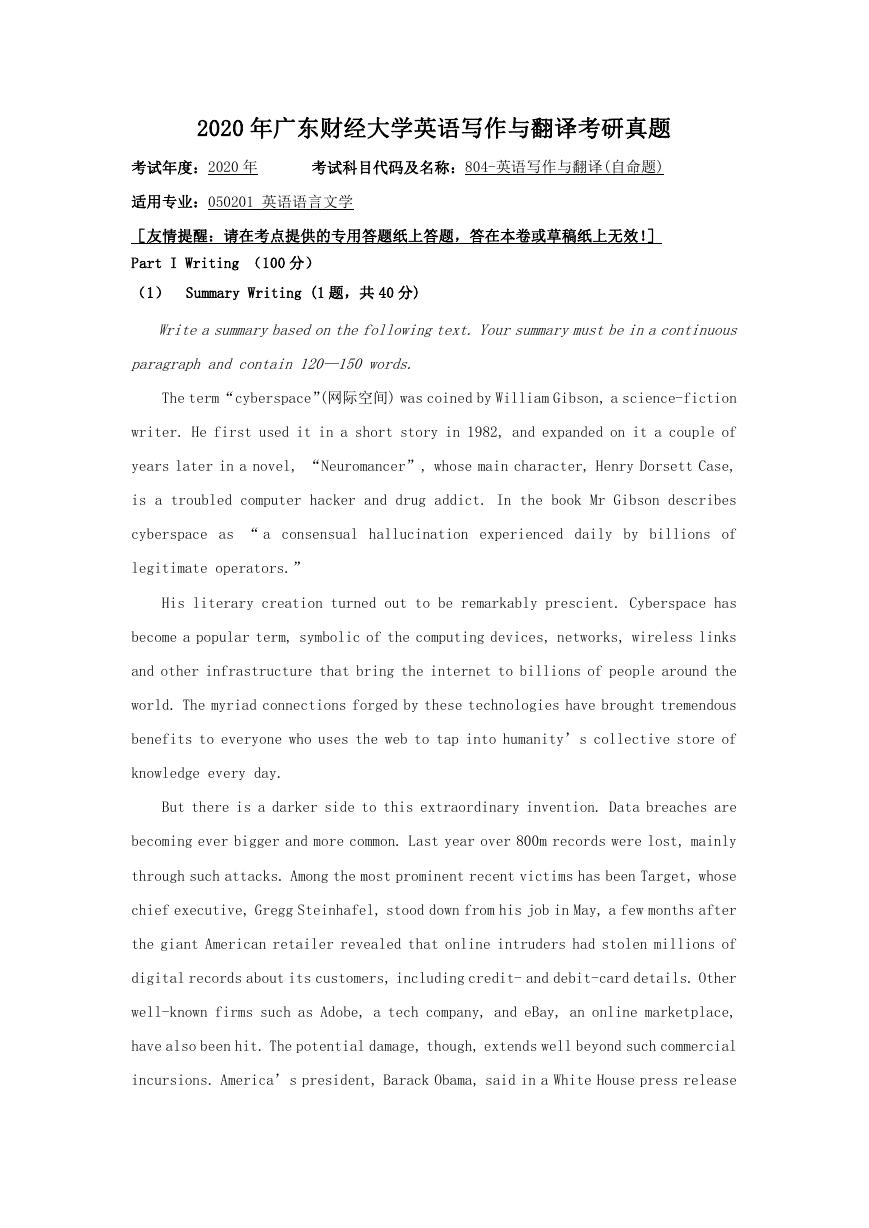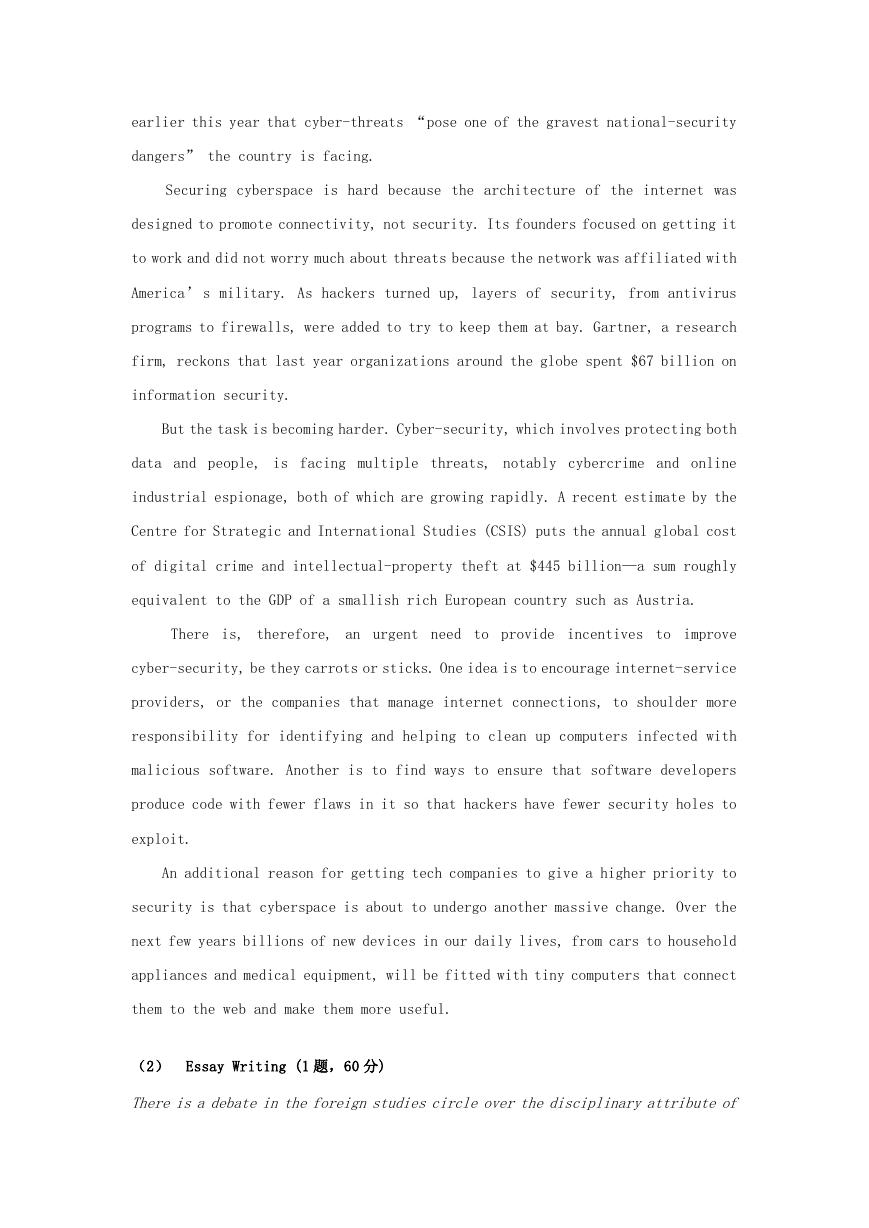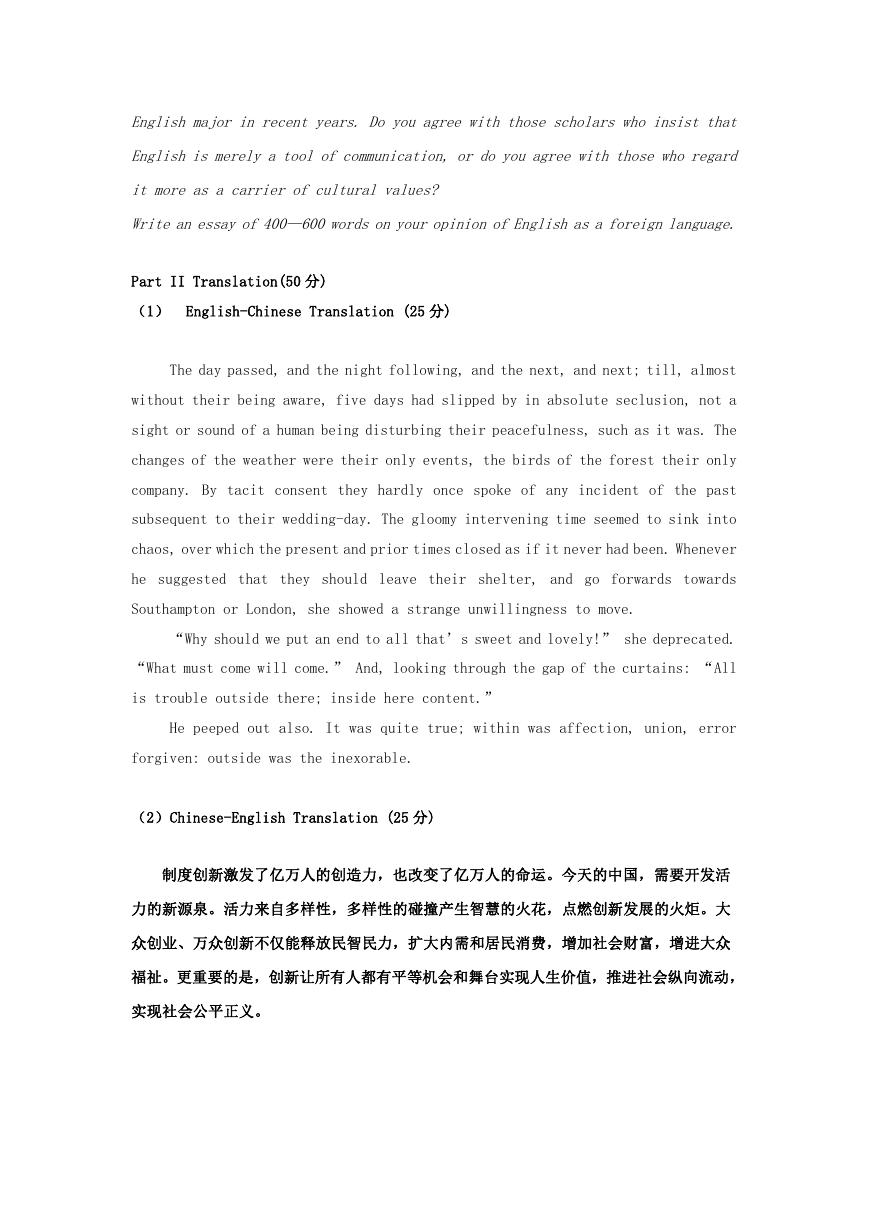2020 年广东财经大学英语写作与翻译考研真题
考试年度:2020 年
考试科目代码及名称:804-英语写作与翻译(自命题)
适用专业:050201 英语语言文学
[友情提醒:请在考点提供的专用答题纸上答题,答在本卷或草稿纸上无效!]
Part I Writing (100 分)
(1) Summary Writing (1 题,共 40 分)
Writeasummarybasedonthefollowingtext.Yoursummarymustbeinacontinuous
paragraph and contain 120—150 words.
The term“cyberspace”(网际空间) was coined by William Gibson, a science-fiction
writer. He first used it in a short story in 1982, and expanded on it a couple of
years later in a novel, “Neuromancer”, whose main character, Henry Dorsett Case,
is a troubled computer hacker and drug addict. In the book Mr Gibson describes
cyberspace as “ a consensual hallucination experienced daily by billions of
legitimate operators.”
His literary creation turned out to be remarkably prescient. Cyberspace has
become a popular term, symbolic of the computing devices, networks, wireless links
and other infrastructure that bring the internet to billions of people around the
world. The myriad connections forged by these technologies have brought tremendous
benefits to everyone who uses the web to tap into humanity’s collective store of
knowledge every day.
But there is a darker side to this extraordinary invention. Data breaches are
becoming ever bigger and more common. Last year over 800m records were lost, mainly
through such attacks. Among the most prominent recent victims has been Target, whose
chief executive, Gregg Steinhafel, stood down from his job in May, a few months after
the giant American retailer revealed that online intruders had stolen millions of
digital records about its customers, including credit- and debit-card details. Other
well-known firms such as Adobe, a tech company, and eBay, an online marketplace,
have also been hit. The potential damage, though, extends well beyond such commercial
incursions. America’s president, Barack Obama, said in a White House press release
�
earlier this year that cyber-threats “pose one of the gravest national-security
dangers” the country is facing.
Securing cyberspace is hard because the architecture of the internet was
designed to promote connectivity, not security. Its founders focused on getting it
to work and did not worry much about threats because the network was affiliated with
America’s military. As hackers turned up, layers of security, from antivirus
programs to firewalls, were added to try to keep them at bay. Gartner, a research
firm, reckons that last year organizations around the globe spent $67 billion on
information security.
But the task is becoming harder. Cyber-security, which involves protecting both
data and people, is facing multiple threats, notably cybercrime and online
industrial espionage, both of which are growing rapidly. A recent estimate by the
Centre for Strategic and International Studies (CSIS) puts the annual global cost
of digital crime and intellectual-property theft at $445 billion—a sum roughly
equivalent to the GDP of a smallish rich European country such as Austria.
There is, therefore, an urgent need to provide incentives to improve
cyber-security, be they carrots or sticks. One idea is to encourage internet-service
providers, or the companies that manage internet connections, to shoulder more
responsibility for identifying and helping to clean up computers infected with
malicious software. Another is to find ways to ensure that software developers
produce code with fewer flaws in it so that hackers have fewer security holes to
exploit.
An additional reason for getting tech companies to give a higher priority to
security is that cyberspace is about to undergo another massive change. Over the
next few years billions of new devices in our daily lives, from cars to household
appliances and medical equipment, will be fitted with tiny computers that connect
them to the web and make them more useful.
(2) Essay Writing (1 题,60 分)
Thereisadebateintheforeignstudiescircleoverthedisciplinaryattributeof
�
English major in recent years. Do you agree with those scholars who insist that
English is merely a tool of communication, or do you agree with those who regard
it more as a carrier of cultural values?
Writeanessayof400—600wordsonyouropinionofEnglishasaforeignlanguage.
Part II Translation(50 分)
(1) English-Chinese Translation (25 分)
The day passed, and the night following, and the next, and next; till, almost
without their being aware, five days had slipped by in absolute seclusion, not a
sight or sound of a human being disturbing their peacefulness, such as it was. The
changes of the weather were their only events, the birds of the forest their only
company. By tacit consent they hardly once spoke of any incident of the past
subsequent to their wedding-day. The gloomy intervening time seemed to sink into
chaos, over which the present and prior times closed as if it never had been. Whenever
he suggested that they should leave their shelter, and go forwards towards
Southampton or London, she showed a strange unwillingness to move.
“Why should we put an end to all that’s sweet and lovely!” she deprecated.
“What must come will come.” And, looking through the gap of the curtains: “All
is trouble outside there; inside here content.”
He peeped out also. It was quite true; within was affection, union, error
forgiven: outside was the inexorable.
(2)Chinese-English Translation (25 分)
制度创新激发了亿万人的创造力,也改变了亿万人的命运。今天的中国,需要开发活
力的新源泉。活力来自多样性,多样性的碰撞产生智慧的火花,点燃创新发展的火炬。大
众创业、万众创新不仅能释放民智民力,扩大内需和居民消费,增加社会财富,增进大众
福祉。更重要的是,创新让所有人都有平等机会和舞台实现人生价值,推进社会纵向流动,
实现社会公平正义。
�






 2023年江西萍乡中考道德与法治真题及答案.doc
2023年江西萍乡中考道德与法治真题及答案.doc 2012年重庆南川中考生物真题及答案.doc
2012年重庆南川中考生物真题及答案.doc 2013年江西师范大学地理学综合及文艺理论基础考研真题.doc
2013年江西师范大学地理学综合及文艺理论基础考研真题.doc 2020年四川甘孜小升初语文真题及答案I卷.doc
2020年四川甘孜小升初语文真题及答案I卷.doc 2020年注册岩土工程师专业基础考试真题及答案.doc
2020年注册岩土工程师专业基础考试真题及答案.doc 2023-2024学年福建省厦门市九年级上学期数学月考试题及答案.doc
2023-2024学年福建省厦门市九年级上学期数学月考试题及答案.doc 2021-2022学年辽宁省沈阳市大东区九年级上学期语文期末试题及答案.doc
2021-2022学年辽宁省沈阳市大东区九年级上学期语文期末试题及答案.doc 2022-2023学年北京东城区初三第一学期物理期末试卷及答案.doc
2022-2023学年北京东城区初三第一学期物理期末试卷及答案.doc 2018上半年江西教师资格初中地理学科知识与教学能力真题及答案.doc
2018上半年江西教师资格初中地理学科知识与教学能力真题及答案.doc 2012年河北国家公务员申论考试真题及答案-省级.doc
2012年河北国家公务员申论考试真题及答案-省级.doc 2020-2021学年江苏省扬州市江都区邵樊片九年级上学期数学第一次质量检测试题及答案.doc
2020-2021学年江苏省扬州市江都区邵樊片九年级上学期数学第一次质量检测试题及答案.doc 2022下半年黑龙江教师资格证中学综合素质真题及答案.doc
2022下半年黑龙江教师资格证中学综合素质真题及答案.doc